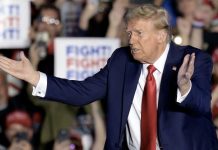
Jan. 23 (UPI) — The Trump administration on Monday imposed a 30 percent tariff on solar panels and washing machines, drawing mixed reactions from manufacturers of those products.
The move is expected to cause upheaval in the $28 billion industry that imports 80 percent of its products abroad, mostly Asian countries including Malaysia, Korea, Vietnam, Thailand and China.
In a statement, U.S. Trade Representative Robert Lighthizer said President Trump has approved the tariffs based on recommendations from “the independent, bipartisan U.S. International Trade Commission that increased foreign imports of washers and solar cells and modules are a substantial cause of serious injury to domestic manufacturers.”
“These cases were filed by American businesses and thoroughly litigated at the [ITC] over a period of several months,” Lighthizer said, adding, “The President’s action makes clear again that the Trump Administration will always defend American workers, farmers, ranchers, and businesses in this regard.”
The tariffs will last for four years and gradually decrease to 15 percent after the first year. The first 2.5 gigawatts of imported solar cells will be exempt each year.
The 30 percent tariff was lower than the 35 percent tariff recommended by the ITC.
Suniva, a Georgia-based but majority Chinese-owned solar panel manufacturer that went bankrupt in November and had been pushing the administration to impose the tariffs, praised the announcement.
“Over the last five years, nearly 30 American solar manufacturers collapsed; today the president is sending a message that American innovation and manufacturing will not be bullied out of existence without a fight,” the company said, according to The Hill. “This is a step forward for this high-tech solar manufacturing industry we pioneered right here in America.”
But not everybody in the solar sector echoed that sentiment.
The Solar Energy Industries Association, a lobbying group for solar manufacturers, said the tariffs would increase prices, kill 23,000 jobs and cancel billions of dollars in solar technology investment.
“While tariffs in this case will not create adequate cell or module manufacturing to meet U.S. demand, or keep foreign-owned Suniva and SolarWorld afloat, they will create a crisis in a part of our economy that has been thriving, which will ultimately cost tens of thousands of hard-working, blue-collar Americans their jobs,” Abigail Ross Hopper, SEIA’s president, said in a statement.
SolarWorld, which pushed for tariffs along with Suniva, is a U.S.-based subsidiary of a German company.
The news was closely watched in California, which is home to 100,000 of approximately 260,000 solar industry jobs in the United States.
“[V]irtually every solar company will be impacted by this,” David Hochschild, one of five members of the California Energy Commission, told The Mercury News.





